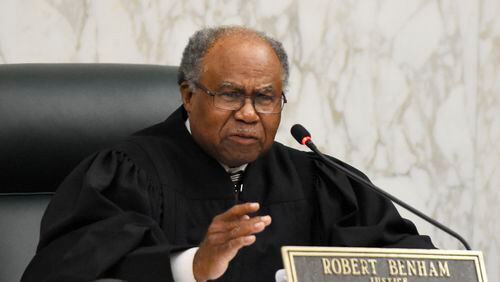Two sudden retirements in the span of a few hours have altered the turmoil of the 2020 election cycle. Adding and subtracting.
The first came mid-morning when U.S. Rep. Tom Graves of Ranger, the longest-serving Republican in Georgia's House delegation, announced he wouldn't stand for election to his northwest Georgia seat next year.
Graves’ stated reason was the need to embark on a “new season” in life with his wife, who is on the cusp of retirement.
The seat is safely Republican. Graves won his 2018 contest with 77% of the vote. But he had recently lost a pair of races for leadership positions in the House Republican conference -- and life as a minority member is no bed of roses.
According to the count kept by WSB Radio's Jamie Dupree in Washington, 30 House members have decided not to run for re-election next year. Twenty-one, including Graves, are Republicans.
Even so, the abrupt timing has led to early speculation. Graves’ resignation came the day after Gov. Brian Kemp tapped finance executive Kelly Loeffler to the Senate, raising questions about whether Graves might intend to challenge her.
Within a few hours, potential candidates for the 14th District congressional seat emerged. Among them are two millennials: State Rep. Trey Kelley of Cedartown, a top Republican in that caucus, and Paulding County school board member Jason Anavitarte, a prominent Latino conservative. The name of state Sen. Jeff Mullis of Chickamauga has also surfaced.
Only a few hours later, word arrived that Georgia Supreme Court Justice Robert Benham would retire on March 1. Only last May, Benham,73, had announced that he intended to serve out his term, which ends Dec. 31, 2020.
That sparked a four-candidate race to replace him. From our AJC colleague Bill Rankin:
Court of Appeals Judge Sara Doyle was the first to announce she was running for what was believed to be Benham's upcoming open seat. Former U.S. Rep. John Barrow then joined the race, followed by former state lawmaker Beth Beskin and Superior Court Judge Horace Johnson, who presides over Newton and Walton counties.
We do not know why Benham has pushed up his departure. But by stepping down on March 1, he gives Governor Kemp the chance to appoint his successor. And that pushes the election for that seat to 2022.
According to state law, if a judicial appointment made six months before an election, the new incumbent is given a chance to get on his/her feet before facing voters in the next election cycle.
Many of you are now counting the months between March and November on your fingers. But nonpartisan judicial contests are held concurrent with the state’s primaries. In May. That’s only two fingers.
In 2018, the state Legislature passed a bill making local district attorneys subject to the same substitution rules -- even though those posts are very, very partisan.
One of the four candidates in the Supreme Court race, Appeals Court Judge Sara Doyle, told Rankin she’d apply with the Judicial Nominating Commission for the job. Eight candidates have already lined up to run for her current job.
***
Heads up: The interview schedule for Fox News Sunday has a name you don't see on live TV that often -- former Georgia senator Sam Nunn. Presumably, he'll be there to talk about President Donald Trump's recent NATO experience.
Nunn will be talking from the Ronald Reagan presidential library in California, where he’ll receive the Ronald Reagan Peace Through Strength Award on Saturday. Receiving the same honor: Former secretary of defense James Mattis, who left the Trump administration one year ago.
***
The Marietta Daily Journal reports that a former Kennesaw State University cheerleader who took a knee during the national anthem at a KSU football game in 2017 has been paid $145,000 in a subsequent out-of-court settlement, documents show. The settlement was announced in November, but the state pay-out was not disclosed at the time.
***
On Thursday, Georgia WIN List announced a first round of 12 endorsements in 2020 state legislative contests.
Five of the endorsements by the group, which backs pro-choice women, were incumbents who won in 2018.
Three are state Senate candidates:
-- Kelly Rose, for the District 17 seat currently held by Brian Strickland, R-McDonough;
-- Kim Jackson, for the District 41 seat being given up by Senate Minority Leader Steve Henson, D-Tucker;
-- and Sarah Beeson, for the District 56 seat currently held by John Albers, R-Roswell.
Five are state House candidates:
-- Luisa Wakeman, for the District 43 seat now held by Sharon Cooper, R-Marietta. (Wakeman lost by 818 votes in 2018.)
-- Shea Roberts, for the House District 52 seat now held by Deborah Silcox, R-Sandy Springs.
-- Regina Lewis Ward, for the House District 109 seat now held by Dale Rutledge, R-McDonough.
-- Joyce Barlow, for House District 151, now held by Gerald Greene, R-Cuthbert.
-- and Julie Jordan, for coastal House District 169, now held by Dominic LaRiccia, R-Douglas.
***
Whether college athletes should be paid or receive other types of compensation is the focus of a new bipartisan Senate working group that includes U.S. Sen. David Perdue, R-Ga.
The effort is the brainchild of U.S. Sens. Mitt Romney, R-Utah, and Chris Murphy, D-Conn. Other members include Marco Rubio, R-Fla., and Cory Booker, D-N.J.
The group will meet with representatives from colleges and universities, athletes and experts, according to a press release announcing its formation. In a statement, Perdue credited the NCAA with beginning the conversation about athlete compensation. The Georgia senator it was important to bring all stakeholders to the table.
“Having spent a portion of my career working in the athletic industry, I know how important it is to preserve the collegiate sports experience while promoting equality for student athletes across all 50 states,” said Perdue, who was once CEO and president of Reebok.
In September, California's governor defied the NCAA by signing into law a bill that would require collegiate athletes to be paid beginning in 2023.
A similar bill was filed in the Georgia General Assembly soon after.










